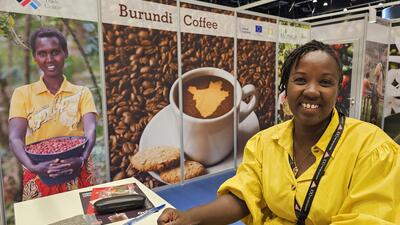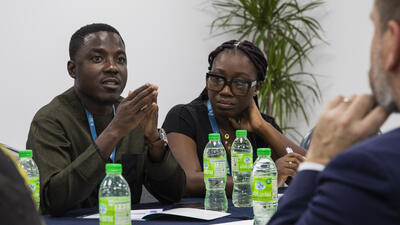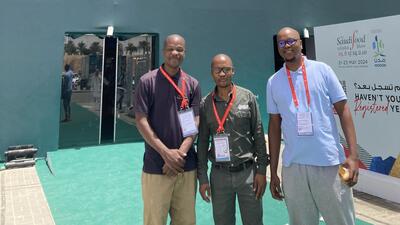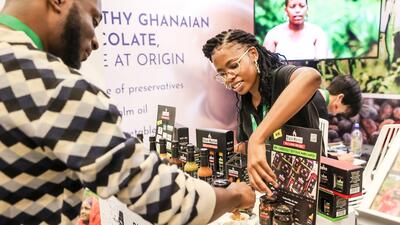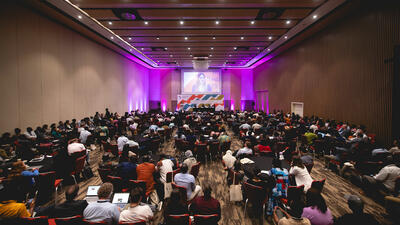


African startups in spotlight at world’s biggest mobile event
Six African tech companies showed how they’re expanding access to financial services and marketing.
Six African startups showcased their businesses at the Mobile World Congress, the globe’s biggest connectivity event.
The event in Barcelona gathered more than 88,500 telecom operators, entrepreneurs, corporations, and public institutions to network and create meaningful partnerships through connectivity.
GSMA, which represents mobile network operators around the world, hosts the event. In September, the International Trade Centre (ITC) and GSMA launched a Working Group that aims to bring connectivity to more small businesses in underserved countries.
The companies from Benin, Senegal, Tanzania, Uganda and Zambia took part in the 4YFN innovation hall. The name comes from the vision of looking to the future, or 4 Years From Now.
Sparco, a Zambian start-up, took top honours by winning a global pitch battle for financial tech companies.
For the African tech start-ups, the exhibition was an opportunity to secure business opportunities and to showcase Africa technology beyond borders. Especially in Africa, with a large population that relies on mobile money rather than traditional banks, technology promotes financial inclusion and connects people to digital services.
The companies in the ITC Pavilion work in both financial (fintech) and marketing technology (martech). Travelling to Barcelona gave the firms greater visibility and a chance to further their close connections with telecoms, either as partners or clients.
Beem in Tanzania and LAfricaMobile in Senegal are marketing platforms that help people access several services that help companies improve customer communications.
Sparco, ChapChap and GnuGrid in Uganda, and FedaPay in Benin ease access to financial services and credit scoring.
Sparco and ChapChap were both selected to pitch at the flagship Fintech Battle competition, competing with Austrian and Spanish start-ups. In winning the competition, Sparco gained valuable exposure, access to the 2024 edition, and networking with investors.
Located in the heart of the event, the ITC Pavilion gave the start-ups direct access to major connectivity and mobile industry players, which facilitated connections and business leads.
For companies that already had clients and partners in Europe, the event anchored them further in the European market and strengthened existing relationships.
The pavilion was visited by high-level officials, including:
- Felix Mutati, the Minister of Technology and Science of Zambia
- Mana Aidara, Networks and Services Director of Senegal ARTP
- Irene Kaggwa Sewankambo, Acting Executive Director of the Uganda Communications Commission
- Mats Granryd, Director General of GSMA
Granryd discussed with the team the ongoing partnership with ITC which positions small businesses at the heart of connectivity and emphasises how fintechs and mobile money promote financial inclusion in Africa.
The start-ups’ work is changing the tech industry in Africa by solving systemic problems such as lack of access to credit scoring, a large unbanked population, and a deep digital divide. Showcasing their work at international platforms such as 4YFN shares the potential of African start-ups on the global stage.
About the projects
The Netherlands Trust Fund V (NTF V) (July 2021 – June 2025) is based on a partnership between the Ministry of Foreign Affairs of The Netherlands and the International Trade Centre. The programme supports MSMEs in the digital technologies and agribusiness sectors. Its ambition is two-fold: to contribute to an inclusive and sustainable transformation of food systems, partially through digital solutions, and to drive the internationalization of tech start-ups and export of IT&BPO companies in selected Sub-Saharan African countries.
The International Trade Centre (ITC) initiative Switch ON focuses on digital connectivity, prioritizes investments in connectivity and calls on policymakers to create the right conditions for small businesses in developing countries to profit from digital trade and entrepreneurship. It also focuses on delivering affordable networks and unlocking access through education and digital literacy.








